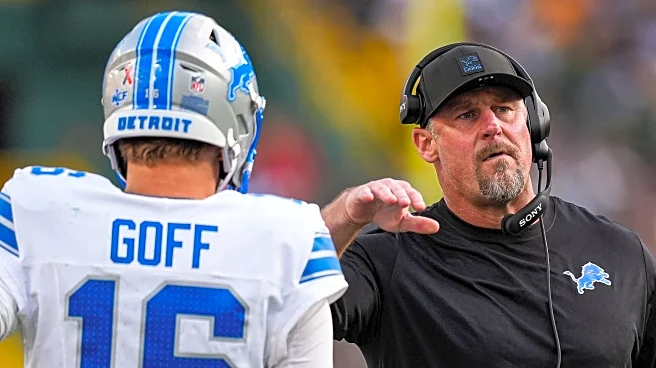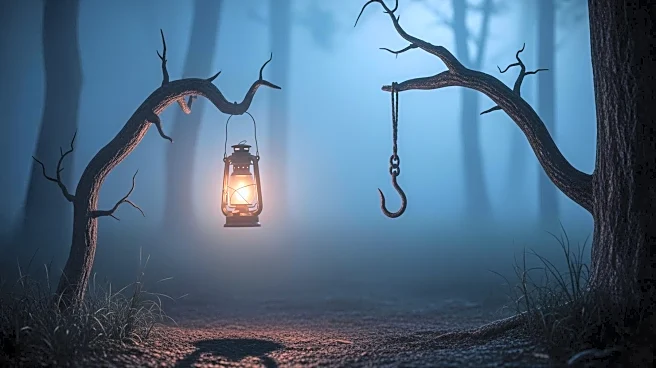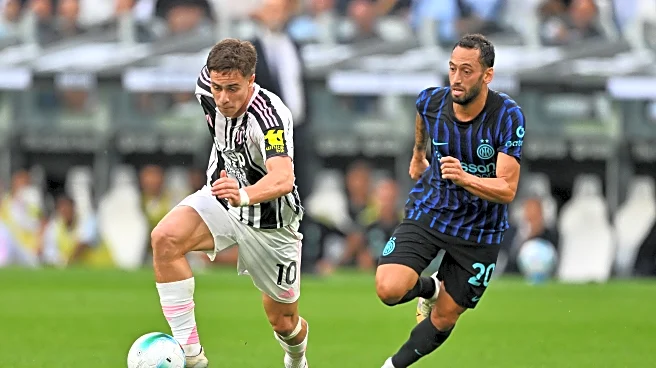To say the Detroit Lions’ season got off to a rocky start would be offensive to rocky starts. Their first half of football felt like the transition from a paved road to a dirt one in Michigan during March: equal parts jarring and maddening. How could you forget the sign clearly posted ahead of the back road? “Offensive Line Under Repair.” Frank Ragnow was (is?) missed right now in the middle of this offensive line. Detroit started the offseason with Tate Ratledge assuming the mantle, but it wasn’t
long until they decided that it was Graham Glasgow’s job instead. Glasgow looked like the team’s second choice at times on Sunday.
“Well, I think they’ve come a long way, that’s for sure,” Dan Campbell said about the offensive line congealing prior to the start of the regular season.
“You know, you see a ton of growth with those five [starting offensive linemen], and really we’ve had them together now since, what was that, about a week into training camp? And then we made the move of Graham [Glasgow] back to center. So they’ve been working together now for over a month, and so you do see the growth. There’s that communication that takes place that is big with those guys. So it’s good, I feel really good about it.”
After Sunday, you couldn’t fault anyone who doesn’t share in Campbell’s initial enthusiasm about the reworked offensive line. But it’s not where you start, it’s where you finish.
“I also know we’re not done—they’re not done,” Campbell wrapped up his preseason assessment of his starting offensive line. “And that’s encouraging, I say that in a good way. Like, man, there’s so much growth left to take place, with not only those two [Mahogany and Ratledge], but them collectively as a unit, so that’s pretty exciting.”
This was Glasgow’s third start at center since 2023. It was Christian Mahogany’s third start of his NFL career. Tate Ratledge didn’t look like a rookie on the other side of his first set of regular season snaps. Week 1 isn’t the finish line, and Detroit’s reworked offensive line struggled in its first outing, but it’s going to need to coalesce sooner than later to get the offense up and running—literally.
Offense
While protection wasn’t the only issue, it set the tone for an offense that never found its rhythm.
After watching the first 30 minutes of offense for Detroit, Sam LaPorta’s involvement in the first drive after halftime was a sight for sore eyes. A big grab and run of 32 yards by LaPorta got them into Green Bay territory, and then a 16-yard catch got Detroit into the red zone for the third time of the day—and a fiery LaPorta got up looking to spark some more rhythm and momentum, something absent from the Lions offense all game long. It was one step forward, two steps back—sometimes 6 yards back on second-and-goal, sometimes it was nearly being driven back into their own endzone. But it never really felt like the Lions offense could get into a rhythm.
And while on the topic, it didn’t just feel like the Lions offense included a metric ton of checkdowns: it did. Goff had a couple of throws he missed on, but for the most part, he was content with checking it down to a stationary receiver situated a few yards past the line of scrimmage—and that happened a lot.
“They play deep coverage, man,” Campbell noted in his post-game presser. “They play a lot of Cover 2, they’ll play some [Cover] 3 Buzz, and they keep everything in front of them. That’s how that defense is designed, and so we knew that. And the plan was to stay patient, be patient, which I thought Goff was.”

The Lions running backs failed to make a mark (22 carries for 46 yards, just 2.1 yards per carry) for the first time in what feels like a long time, too. You’d have to go back to Week 6’s matchup with the Tampa Bay Buccaneers during the 2023 season for a game with fewer rushing yards (40)—a game where Jahmyr Gibbs was inactive and David Montgomery was injured and ruled out before halftime.
Speaking of Gibbs, he was the most targeted player on the day, catching all 10 of his targets for… 31 yards. Goff rarely let it rip, which sounds like it was going to be something earned, not given against this Packers defense. When they did earn shots, the pass-protection or downfield coverage or some combination of the two prevented Goff from pushing the ball downfield. 31 of his 39 passes were within 10 yards of the line of scrimmage; just four of his 31 completions were beyond 10 yards.
Defense
So not only did everything look bad for the Lions’ offense through the first quarter of football, it looked equally as bad for the defense! The part that arguably made it worse was that it sometimes felt like self-sabotage. Growing up in the 90s and early 00s, there was a local joke that the two most popular positions in Detroit sports were the backup goalie for the Red Wings and the backup quarterback job for the Lions. This generation’s version of that is the yet-to-be-anointed, hypothetical pass rusher opposite of Aidan Hutchison. But what was most frustrating about Detroit’s start on defense was, again, it felt like their own undoing. The Lions were able to force the Packers into five third downs across their first two drives, but Kelvin Sheppard’s decision to drop Hutchinson, Marcus Davenport, and Derrick Barnes into coverage during pass-rushing situations felt like a real head-scratcher for the first-time defensive coordinator. Especially when Green Bay converted, in order, a third-and-10, third-and-6, third-and-9 (for a touchdown), and a third-and-7 in less than a quarter’s time.
If you set aside Sheppard’s questionable strategy early on, the Lions’ defense had stretches where things looked real and felt familiar. They still can very much defend the run, bottling up the Packers’ ground game and earning themselves the right to pin their ears back and drop into coverage. Jokes aside, Detroit strung together a stretch of defense where they forced the Packers to punt on three straight series—two of them three-and-out—and limited them to just 56 yards on 14 plays while the game was still 17-6, Green Bay.
And lastly, of course, the turnovers that weren’t. On back-to-back plays, Alex Anzalone had an errantly thrown gift-wrapped pick slip through his grasp, and a handsy rep from Rock Ya-Sin overturned a beautiful interception returned for a touchdown by Brian Branch on the very next play—that wouldn’t have counted either because of a penalty on Hutchinson during the return. The game was 17-6 at that point, and instead of potentially being within five or three points depending on the outcome of a two-point conversion on the negated Branch interception, the Lions found themselves pinned on their own 8-yard line after Green Bay’s third consecutive punt.
Detroit had a slow start last year, too, marred by red zone inefficiency (hello again!) on offense. But if you were paying attention to any of your sundry social media pulled up on a second screen, you would have sworn the Lions had been eliminated in the Divisional Round all over again. Despite those opining if this one was a “must-win” game, Campbell seems confident that this start, this level of unpreparedness, is “not what it appears to be.” And maybe he’s right—but appearances matter. The Lions got off to this rocky start, but it’s now up to Campbell and his new staff of coaches to prove it’s just a stray pot hole and not their first set of consecutive losses since October of 2022.















